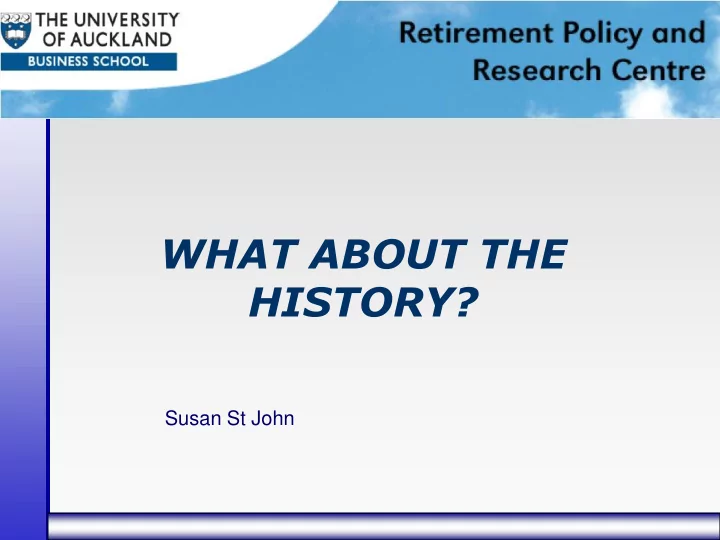

WHAT ABOUT THE HISTORY? Susan St John
History matters “When you are peering into the future to see where you are going it is not at all a bad idea to remember where you have been” Owen Woodhouse 1999
Workers Compensation Origins 1900 Differential levy system Insurance principles Funding Limited benefits for workers “...the dividing line between a man hurt on his way to work and the one injured within the factory gates has at times been so thin as to be almost imperceptible” Young, 1964 Was 24/7 ACC to be an insurance scheme? 3
ACC was to be Social insurance “As the scheme will be a government-scheme of social insurance it must in the final resort receive the backing of the state.” Woodhouse, p 175 4
Woodhouse report “ It is for this reason THAT A FORMAL SYSTEM OF FUNDING CANNOT BE REGARDED AS ESSENTIAL TO THE STABILITY OF THE WHOLE SCHEME” 5
Woodhouse asked: How much would it cost? 1% levy to replace worker’s compensation premiums Scheme’s income would be greater than outgoings for first years Surplus invested Useful contingency reserve Beneficial side effect Never to be on a fully-funded actuarial basis 6
The 1970s 1972 ACC Act appears to set up the funded basis. Actuarial reports required “This basis of funding is likely to prove no more successful than it did for general accident insurance under the old scheme.” Palmer 1977, p 201 7
Why was he so sceptical ? Rapid inflation - long tail of claims “… makes the estimate of contingent liabilities very much a matter of guesswork” Worth “preserving the pretence of a funded scheme until plateau reached” End result a “curious mixture” Provides “useful insulation and flexibility” Palmer 1977, p 201 8
Funding and the 1980s By 1980 Fund = 20 months of claims’ expenditure (over $220m) Pressure for run down 1980 Quigley committee (National) Accident Compensation Act 1982 adopts ‘PAYG’ basis By 1985 levies reduced 30%.. 1987 Reserves down to 2 months – claims of cost blow-out 9
Reserves fell dramatically Cost pressures Levies increased 238% on rise in times of average unemployment and high inflation 1990 reserves back to 13 months 10
Funding and the 1990s 1990 National bows to employer pressure and reduces levies Accident Rehabilitation and Compensation Insurance Act 1992 PAYG basis in the meantime By 1995 reserves down to 3 months 11
History repeats By 1995 reserves down to 3 months 12
Funding and the 1990s 13
Pressure for funding and private insurance By 1997- improved reserves = 6 months ACC suggests big levy reductions 14
1997 Will the cycle repeat? 15
Bolger eventually resists pressure to reduce levies Increased earner’s premium to offset inadvisable tax cuts of 1998? “Any move to introduce competition would almost certainly require full funding for future claim liability.” (Bolger 1997) 16
Accident Insurance Act 1998 Full funding by 2014 Clearly ACC was to be viewed as insurance Full funding facilitated the introduction of Private competition 17
The curious 2000s Election of Labour saw social insurance principles firmly reinstated Injury Prevention, Rehabilitation, and Compensation Act 2001 “to reinforce the social contract represented by the first accident compensation scheme.” Reversed privatisation experiment of the AIA 18
So why did the 2001 Act keep actuarial funding by 2014? Didn’t it just pave the way for new government to: - Claim ACC insolvent? - Charge higher levies – offset inappropriate tax cuts? - Cut entitlements - Privatise ? 19
Labour’s conversion? Actuarial liabilities on balance sheet whether funded or not “As a consequence of improved performance by ACC, its overall unfunded liability has reduced considerably and some schemes are now approaching full funded status.” July 2000, Michael Cullen 20
What would it mean to be full funded today? 21
Déjà vu? Cartoon from the 1970s
Political accord required Agree the basis for reserves Set the fund to be say 2-4 years of claims expenditure and allow to fluctuate as the economy and markets fluctuate 23
"Those who cannot remember the past are condemned to repeat it." George Santayana 24
Recommend
More recommend